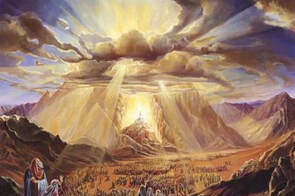| There's the infinite, the transcendent, the supernal, the ... well, whatever it is, or whatever we might conjure it to be. And then there's the day to day, the details, the very earthy and earthly lives we lead. Religion and spiritual life (they're not exactly the same) try to bridge the gap between the two... and can leave us grasping for words. Maybe that's part of the point. |
By Rabbi David Evan Markus
Parashat Mishpatim 5784 (2024)
Okay, we received the Ten Commandments. Now what?
Our Shabbat services last weekend are still with me. Together we invoked our spiritual ancestors who stood at Sinai. We dared to declare that we too stood there. We sang, "For Torah came from Zion and the word of God from Jerusalem." We opened our beautiful Torah scroll to Exodus 20, to a Voice that uttered the Ten Commandments. We crowded around the Torah together as I chanted the Ten in Hebrew and English. I then asked us a question that, to me, seemed straightforward:
"What does receiving the Ten Commandments mean to you? And if it means nothing, what might you want it to mean?"
Silence. Crickets. Like the silent Hebrew letter aleph (א) that is the Ten Commandment's first letter, the silence was deafening.
Parashat Mishpatim 5784 (2024)
Okay, we received the Ten Commandments. Now what?
Our Shabbat services last weekend are still with me. Together we invoked our spiritual ancestors who stood at Sinai. We dared to declare that we too stood there. We sang, "For Torah came from Zion and the word of God from Jerusalem." We opened our beautiful Torah scroll to Exodus 20, to a Voice that uttered the Ten Commandments. We crowded around the Torah together as I chanted the Ten in Hebrew and English. I then asked us a question that, to me, seemed straightforward:
"What does receiving the Ten Commandments mean to you? And if it means nothing, what might you want it to mean?"
Silence. Crickets. Like the silent Hebrew letter aleph (א) that is the Ten Commandment's first letter, the silence was deafening.

Maybe our spiritual ancestors felt that way, too. Standing at Sinai, they didn't quite know what to think. So immense and inexplicable was the experience, so foreign was it to anything they knew, that "they saw the thunder" (Ex. 20:15). Their senses were scrambled into synesthesia. They grew afraid, telling Moses (Ex. 20:16): "You speak to us... and we will obey, but don't let God speak to us [ever again] lest we die."

Maybe fear, inexplicability and confusion explain what happened next. Had our ancestors really grokked the Ten Commandments, there'd be no need for more laws, detailed rules, instructions, guidance, mandates, restrictions. But they didn't – maybe it was all too ethereal, unapproachable, disorienting and scary – so they needed Cliff Notes.
Enter this week's portion (Mishpatim), which begins laying out law after law, rule after rule.
This Torah portion is chock full of details fleshing out the Ten Commandments – indentured servitude rather than slavery, laws against murder versus manslaughter, guidelines about honoring parents, how to deal with property, how to deal with thieves and what constitutes stealing, how to deal with other belief systems, systems of kindness to support the poor and manage laborers, what it means to bear false witness or pervert justice, what it means to honor Shabbat for ourselves and the land, and more. Chapter after chapter, we receive first details about the Ten Commandments, spoken not directly to the people but to Moshe lest the people freak out.
To modern liberal Jews like us, this cascade of commandments may seem too much, as if it were Talmud squeezed into Torah. It seems, however, that our ancestors needed it, and they needed some intermediary to assuage their fear of direct encounter with the Sacred. In our own ways and days – and if our collective experience last weekend is any indication – it seems that often we do, too. (Of course we do: we're human, and direct encounter inherently overwhelms our circuits.)
Yet Torah, and Judaism, are far more than laws, rules and details – and it's pivotal that this portion about laws, rules and details doesn't end with them. After them, God calls Moshe back up the Mountain and coaches Moshe to write down the Covenant "and read it into the ears of the nation" (Ex. 24:7). After doing so, the nation famously responded, "All that YHVH has said, we will do and we will hear" – in Hebrew, נַעֲשֶׂה וְנִשְׁמָע / na'aseh v'nishmah.
Which, if you think about it, is backwards. How can we do before we hear?
The classical rabbinical answer is that our spiritual ancestors, having been seized by fear of the unknown, needed to learn by doing. Only by doing could they learn, and only that way diminish their fear of the unknown.
Educators (and parents) know this axiom by experience: they know that we humans really do tend to learn best by doing, and that often we change not from the inside out but from the outside in. It's why we rarely learn from others' experience, and why kids and teens rarely learn from their parents' and teachers' mistakes. It's also why there's truth to the lyrics in "Whistle a Happy Tune" from The King and I:
"Make believe you're brave / and the trick will take you far, / You may be as brave / as you make believe you are."
Only after our ancestors received details and the disorientation of fear dialed down did they – or at least some of them – become able to experience a mystical vision (Ex. 24:10): "They saw the God of Israel, and under God's feet was the likeness of a brickway of sapphire, like the essence of sky for purity." (Don't overthink this: God can't be seen, God doesn't have "feet," and there wasn't actually a "brickway of sapphire" but rather something "like" one: Torah is confessing that its own words utterly fail to describe a spiritual experience.)
The point, I think, is exactly that. Spiritual life can leave us dumbfounded, grasping for words, unable to find them. Our very sense of self – or, at least, the self we've known – often gets in the way of transcendence. Our minds, our words, our human attempts to categorize and understand, are vitally important yet also inherently limited... so we end up with yet more words and more details to bolster or fill in gaps.
But in the end, the essence isn't about any of that. All our words and laws and customs and rituals are pointers – important pointers, but mere pointers nonetheless. The point is beyond them all. Like our ancestors before us, "We will do and we will hear." We'll learn as we go and, as fear and inhibition diminish, maybe catch a glimpse of eternity.
Enter this week's portion (Mishpatim), which begins laying out law after law, rule after rule.
This Torah portion is chock full of details fleshing out the Ten Commandments – indentured servitude rather than slavery, laws against murder versus manslaughter, guidelines about honoring parents, how to deal with property, how to deal with thieves and what constitutes stealing, how to deal with other belief systems, systems of kindness to support the poor and manage laborers, what it means to bear false witness or pervert justice, what it means to honor Shabbat for ourselves and the land, and more. Chapter after chapter, we receive first details about the Ten Commandments, spoken not directly to the people but to Moshe lest the people freak out.
To modern liberal Jews like us, this cascade of commandments may seem too much, as if it were Talmud squeezed into Torah. It seems, however, that our ancestors needed it, and they needed some intermediary to assuage their fear of direct encounter with the Sacred. In our own ways and days – and if our collective experience last weekend is any indication – it seems that often we do, too. (Of course we do: we're human, and direct encounter inherently overwhelms our circuits.)
Yet Torah, and Judaism, are far more than laws, rules and details – and it's pivotal that this portion about laws, rules and details doesn't end with them. After them, God calls Moshe back up the Mountain and coaches Moshe to write down the Covenant "and read it into the ears of the nation" (Ex. 24:7). After doing so, the nation famously responded, "All that YHVH has said, we will do and we will hear" – in Hebrew, נַעֲשֶׂה וְנִשְׁמָע / na'aseh v'nishmah.
Which, if you think about it, is backwards. How can we do before we hear?
The classical rabbinical answer is that our spiritual ancestors, having been seized by fear of the unknown, needed to learn by doing. Only by doing could they learn, and only that way diminish their fear of the unknown.
Educators (and parents) know this axiom by experience: they know that we humans really do tend to learn best by doing, and that often we change not from the inside out but from the outside in. It's why we rarely learn from others' experience, and why kids and teens rarely learn from their parents' and teachers' mistakes. It's also why there's truth to the lyrics in "Whistle a Happy Tune" from The King and I:
"Make believe you're brave / and the trick will take you far, / You may be as brave / as you make believe you are."
Only after our ancestors received details and the disorientation of fear dialed down did they – or at least some of them – become able to experience a mystical vision (Ex. 24:10): "They saw the God of Israel, and under God's feet was the likeness of a brickway of sapphire, like the essence of sky for purity." (Don't overthink this: God can't be seen, God doesn't have "feet," and there wasn't actually a "brickway of sapphire" but rather something "like" one: Torah is confessing that its own words utterly fail to describe a spiritual experience.)
The point, I think, is exactly that. Spiritual life can leave us dumbfounded, grasping for words, unable to find them. Our very sense of self – or, at least, the self we've known – often gets in the way of transcendence. Our minds, our words, our human attempts to categorize and understand, are vitally important yet also inherently limited... so we end up with yet more words and more details to bolster or fill in gaps.
But in the end, the essence isn't about any of that. All our words and laws and customs and rituals are pointers – important pointers, but mere pointers nonetheless. The point is beyond them all. Like our ancestors before us, "We will do and we will hear." We'll learn as we go and, as fear and inhibition diminish, maybe catch a glimpse of eternity.


 RSS Feed
RSS Feed